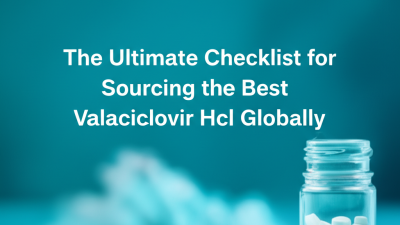Top Strategies for Leveraging Vitamin C Coated Products in Your Business
In recent years, the demand for Vitamin C coated products has surged, driven by growing consumer awareness of the benefits of antioxidants and skin health. According to the 2022 Global Antioxidants Market report, the market for Vitamin C based formulations is expected to reach $1.2 billion by 2026, with a compound annual growth rate (CAGR) of 8.5%. This trend reflects not only a shift towards nutrient-rich skincare but also an increasing inclination towards safe and effective beauty solutions. Companies leveraging Vitamin C coated ingredients can capitalize on this trend, appealing to health-conscious consumers looking for products that promise enhanced efficacy and longer shelf life. With the right strategies, businesses can harness the power of this potent antioxidant to differentiate themselves in a competitive market, offering solutions that meet the evolving needs of their target audience.

Benefits of Using Vitamin C Coated Products in Your Business
Vitamin C coated products have gained traction in the business landscape due to their numerous benefits. One of the primary advantages is their ability to enhance the stability and efficacy of ingredients, especially in skincare and dietary supplements. When businesses incorporate Vitamin C coatings, they not only improve the quality of their products but also increase their market appeal by highlighting the antioxidant properties that consumers are increasingly seeking.
**Tip:** When marketing Vitamin C coated products, emphasize the scientific backing and the potential health benefits. Offering informative content about how Vitamin C can combat oxidative stress and improve skin health will resonate well with health-conscious consumers.
Additionally, Vitamin C coated products can lead to extended shelf life, reducing waste and costs. This longevity not only benefits consumers by providing a reliable product but also helps businesses manage inventory more efficiently.
**Tip:** Consider conducting sampling campaigns to let potential customers experience the advantages of these products firsthand. Feedback from such initiatives can further refine your marketing strategies and enhance customer engagement.

Identifying Target Markets for Vitamin C Coated Products
Identifying the right target markets for Vitamin C coated products is crucial for maximizing their potential in your business. One significant demographic to consider is health-conscious consumers, who actively seek out products that promote wellness and enhance skin health. These individuals are often well-informed and tend to favor brands that prioritize natural ingredients and innovative formulations. Marketing Vitamin C coated products to this audience can be achieved through educational campaigns that highlight the benefits of this antioxidant, positioning it as essential for skincare routines and overall health.
Another key market segment is the beauty and cosmetics industry, where Vitamin C is revered for its brightening and anti-aging properties. Targeting skincare brands, makeup lines, and even spas can open doors for partnerships and collaborations. These entities are always on the lookout for quality ingredients that can set their products apart. By establishing connections and presenting the efficacy of Vitamin C coated products, businesses can tap into a lucrative market eager for cutting-edge solutions that address customer needs for both effectiveness and safety in beauty products.
Effective Marketing Strategies for Vitamin C Innovations
Vitamin C innovations are gaining momentum in the beauty and wellness industry, and adopting effective marketing strategies can significantly enhance your business’s reach. Start by emphasizing the antioxidant benefits of vitamin C in your product descriptions and advertisements.
 Use visuals that highlight vibrant, fresh ingredients and showcase before-and-after results from real users. Storytelling is powerful; share customer testimonials and success stories that illustrate the transformative effects of your Vitamin C coated products. Engaging narratives can captivate potential customers and establish a personal connection to the brand.
Use visuals that highlight vibrant, fresh ingredients and showcase before-and-after results from real users. Storytelling is powerful; share customer testimonials and success stories that illustrate the transformative effects of your Vitamin C coated products. Engaging narratives can captivate potential customers and establish a personal connection to the brand.
Additionally, consider leveraging social media platforms to create buzz around your Vitamin C offerings. Collaborate with influencers who align with your brand values and have a genuine interest in skincare and health. Hosting giveaways and interactive campaigns can drive engagement and expand your audience. Make sure to educate your followers with informative content about the science behind Vitamin C and its importance in skincare routines. By positioning your products not just as items to buy but as integral components of a healthy lifestyle, you can foster loyalty and encourage word-of-mouth referrals.
Integrating Vitamin C Coated Products into Existing Product Lines
Integrating vitamin C coated products into existing product lines presents a unique opportunity for businesses looking to enhance their offerings and meet evolving consumer demands. As companies are increasingly focused on incorporating innovative technologies, the introduction of sophisticated coating systems can streamline this process. For instance, a compact and efficient food coating system can be seamlessly integrated into current production lines, enabling businesses to introduce vitamin C coatings without extensive overhauls to their manufacturing processes.
Moreover, the shift towards sustainability and health-conscious consumer preferences makes vitamin C coated products particularly appealing. By tapping into this trend, brands can differentiate themselves in a crowded market. As evidenced by the latest initiatives in various sectors, adopting cutting-edge technology not only supports product innovation but also aligns with the growing emphasis on environmental responsibility. This integration creates a dual benefit: enhancing product value while appealing to consumers who prioritize both health and sustainability in their purchasing decisions.
Evaluating Customer Feedback and Adapting Vitamin C Offerings
Customer feedback plays a pivotal role in shaping the offerings of vitamin C coated products. By actively soliciting and analyzing customer reviews, businesses can gain valuable insights into consumer preferences and pain points. For instance, feedback indicating a desire for higher potency formulas or alternative flavors can guide product development, allowing brands to tailor their offerings to meet market demands. Engaging with customers not only fosters loyalty but also enhances the overall quality of the products, resulting in a competitive edge.
In addition to gathering feedback, it is essential to adapt marketing strategies based on consumer responses. If customers express concerns about product efficacy or side effects, businesses should be prepared to address these issues transparently. This could involve investing in educational campaigns that highlight the benefits of vitamin C coatings, while also reassuring consumers with information on safety and sourcing. By demonstrating responsiveness to customer feedback, brands can strengthen their credibility and encourage repeat purchases, ensuring that their vitamin C offerings remain relevant and appealing in a dynamic market.
Top Strategies for Leveraging Vitamin C Coated Products in Your Business - Evaluating Customer Feedback and Adapting Vitamin C Offerings
| Strategy | Customer Feedback | Adaptation Recommendations | Sales Impact |
|---|---|---|---|
| Launch a Limited Edition Product | Positive reception; customers love exclusivity. | Increase marketing around scarcity; consider seasonal themes. | +20% increase in sales during launch period. |
| Enhanced Education on Benefits | Mix of positive and neutral; better understanding needed. | Create informative content; webinars on Vitamin C. | +15% in product inquiries. |
| Bundle Products for Value | Highly favorable; customers appreciate savings. | Develop attractive bundle deals; track performance. | +30% increase in sales; improved average order value. |
| Loyalty Programs | Positive feedback; rewards foster loyalty. | Enhance point accumulation; exclusive rewards for Vitamin C purchases. | Retention rate improved by 25%. |
| Customer Personalization | Mixed results; some crave personalization. | Use surveys to tailor recommendations for Vitamin C products. | Sales increase by 10% for personalized offerings. |
Related Posts
-

Revolutionizing Nutrition: Industry Applications of Best Vitamin C Coated Supplements and Their Efficacy
-

Understanding Industry Standards for Best Propylene Glycol Production and How to Choose the Right Grade
-

Unlocking the Advantages of Ferulic Acid for Innovative Global Supply Chain Solutions
-

Unlocking the Power of Best Ferulic Acid: Top 5 Industry Use Cases for Global Buyers
-

Exploring Effective Alternatives to Best Tylosin Phosphate for Livestock Health
-

The Ultimate Checklist for Sourcing the Best Valaciclovir Hcl Globally





